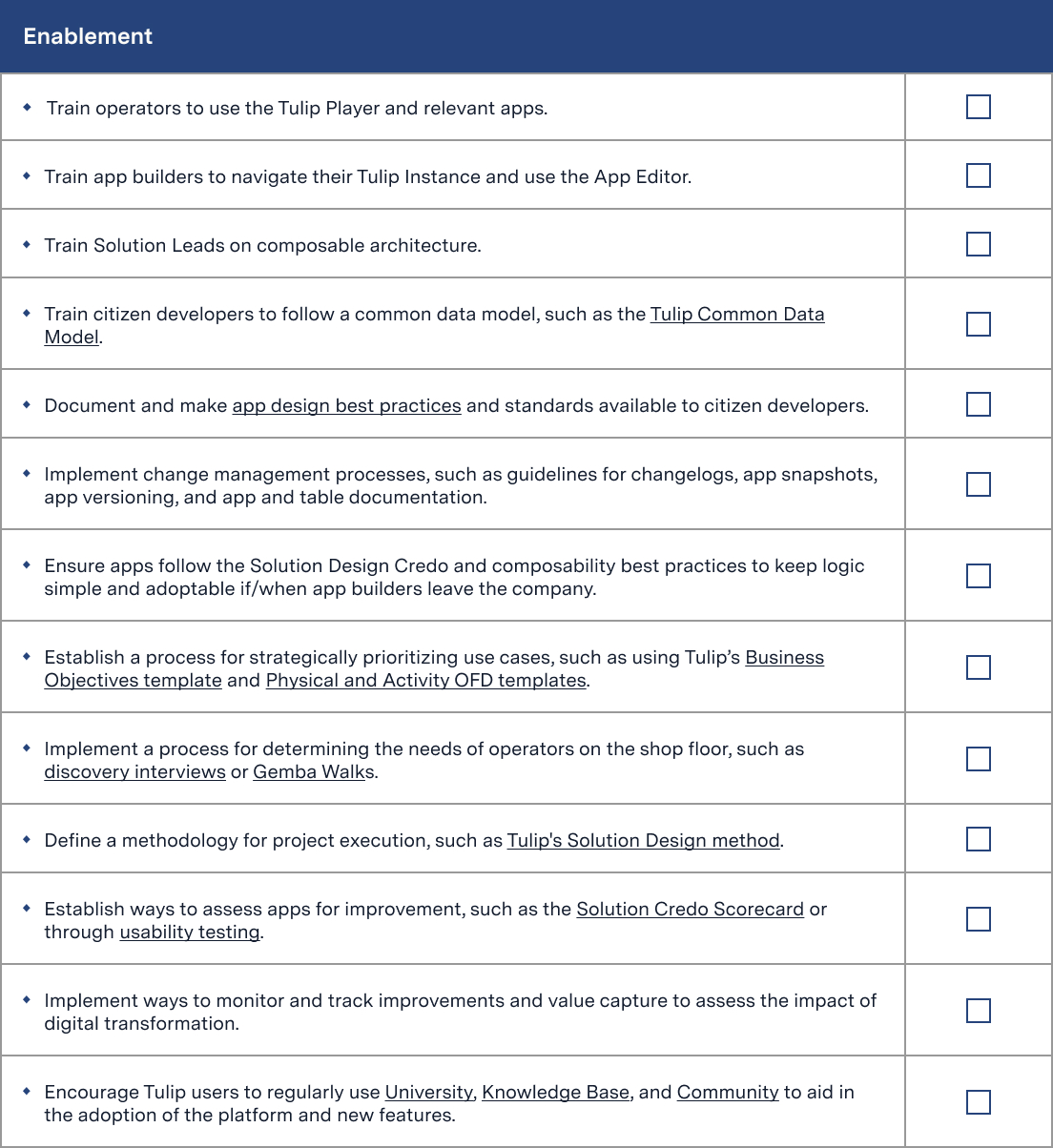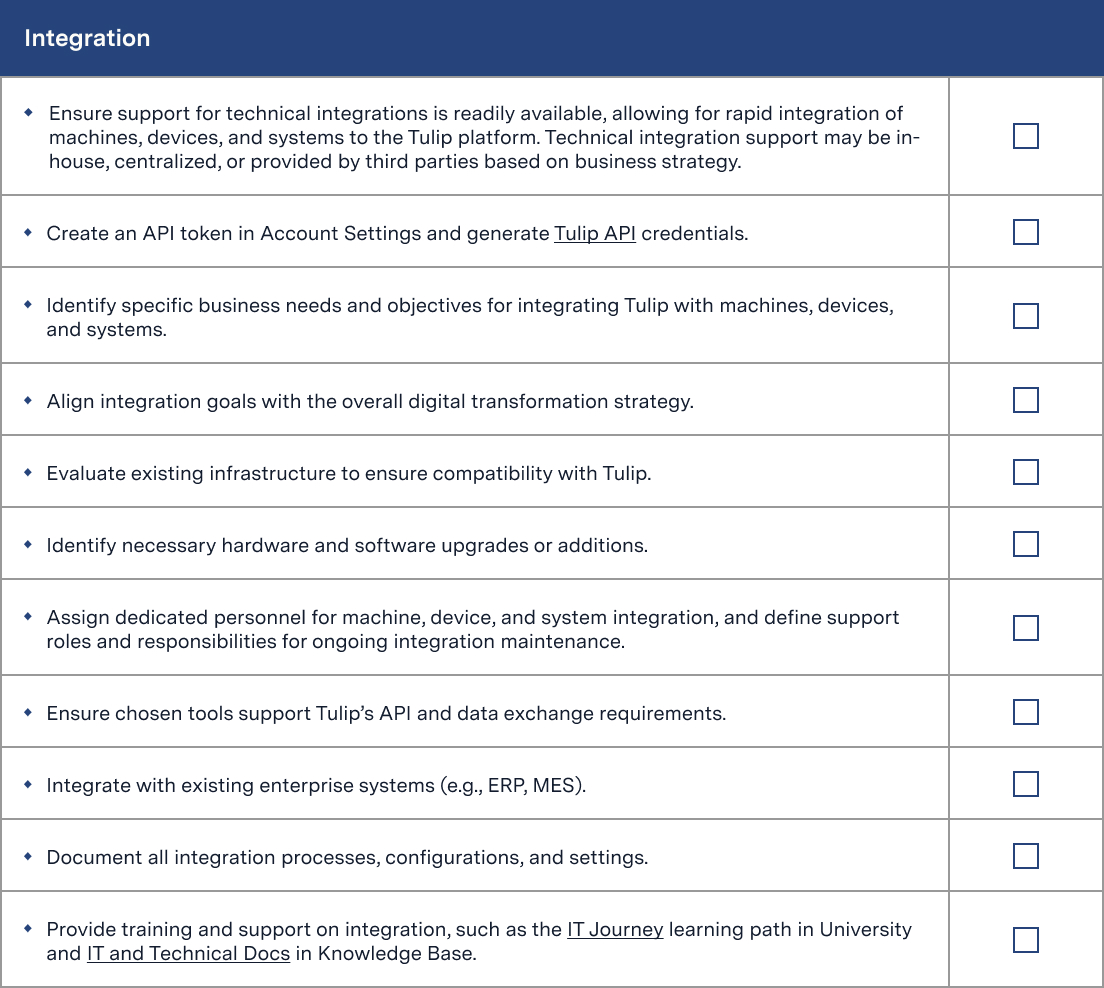This article is one dimension of our Digital Transformation assessment{target=_blank}.
Panoramica
La dimensione delle capacità e delle competenze si concentra sulle strutture organizzative messe in atto per l'esecuzione della governance. Questa sezione si occupa di consentire l'implementazione tattica di Tulip. I componenti chiave includono:
- Priorità e pianificazione tattica: Standardizzare le priorità dei casi d'uso. Potete usare il modello degli Obiettivi di business di
Tulip{target=_blank}per determinare le metriche e creare gliOFDfisici e di attività{target=_blank} per pianificare le soluzioni. Condurreintervistedi scoperta{target=_blank} con gli operatori per identificare le esigenze degli utenti. - Esecuzione del progetto: Definire una metodologia per lo sviluppo del progetto, come il nostro
metodoSolution Design{target=_blank}. Le applicazioni devono seguire le migliori pratiche architettoniche e di progettazione definite, come il SolutionCredodi Tulip{target=_blank} e le Best Practices diprogettazione{target=_blank}. - Acquisizione del valore/tracciamento dei miglioramenti: Monitorare e tenere traccia dei miglioramenti e dell'acquisizione di valore per valutare l'impatto della trasformazione digitale. (Ad esempio, le applicazioni possono essere valutate conducendo
testdi usabilità{target=_blank} con gli operatori e valutate con la Tulip Solution CredoScorecard{target=_blank}).
Questa dimensione valuta anche la capacità dell'organizzazione di adottare e implementare nuove tecnologie in modo efficace, come ad esempio:
- disporre di processi che consentano sia l'adozione della piattaforma Tulip che lo sviluppo del cittadino
- disporre di processi e capacità di gestione del cambiamento
- Capacità tecniche
- Supporto e formazione per supportare e gestire l'adozione di Tulip.
Abilitazione
L'abilitazione si concentra sull'esecuzione della strategia di governance e sull'abilitazione delle persone e dei team che lavorano su Tulip. Dovrebbero essere in atto processi e procedure che guidino l'adozione della piattaforma Tulip, nonché strutture e metodi per integrare la piattaforma nelle operazioni dell'organizzazione.
Lista di controllo

Scarica le liste di controllo della trasformazione digitale
qui{target=_blank}.
Supporto
Il supporto tecnico esamina l'esistenza di strutture e processi in grado di fornire assistenza tecnica per le operazioni quotidiane della piattaforma e per il miglioramento continuo degli strumenti digitali e della raccolta dei dati. Questa dimensione si concentra sulla democratizzazione e sulla facilità con cui è possibile coinvolgere nuovi utenti e affrontare nuovi casi d'uso. I processi di supporto devono essere sistematici, ripetibili e scalabili.
Lista di controllo

Scarica le liste di controllo della trasformazione digitale
qui{target=_blank}.
Integrazione
Il supporto per le integrazioni tecniche deve essere prontamente disponibile, consentendo una rapida integrazione di macchine, dispositivi e sistemi nella piattaforma Tulip, in modo da poterli utilizzare nelle soluzioni. Il supporto per l'integrazione tecnica può essere interno, centralizzato o fornito da terzi in base alla strategia aziendale.
Lista di controllo

Scarica le liste di controllo della trasformazione digitale
qui{target=_blank}.
